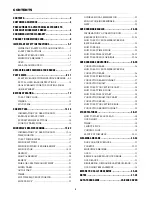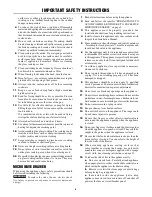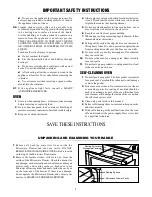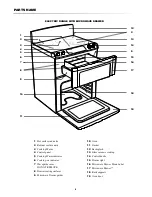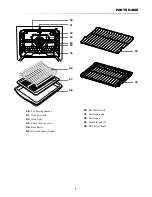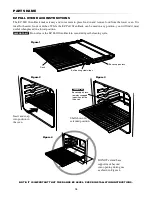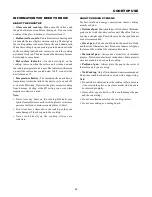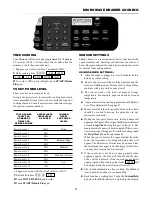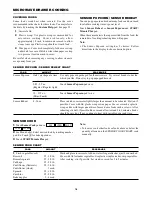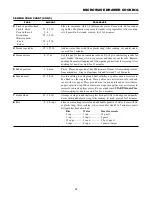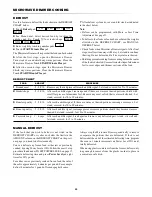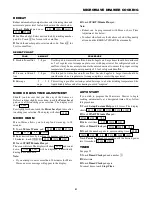
imPortAnt.sAfety.instructions
earthware or other glazed utensils are suitable for
cooktop service without breaking due to the sudden
change in temperature.
4
To reduce the risk of burns, ignition of flammable
materials and spillage due to unintentional contact with
utensils, the handle of a utensil should be positioned so
that it is turned inward and does not extend over adjacent
surface units.
5
Do not cook on broken cooktop. If cooktop should
break, cleaning solutions and spillovers may penetrate
the broken cooktop and create a risk of electric shock.
Contact a qualified technician immediately.
6
Clean cooktop with caution. If a wet sponge or cloth is
used to wipe spills on a hot surface unit, be careful to
avoid steam burn. Some cleaners can produce noxious
fumes if applied to a hot surface. Please see cleaning
the glass cooktop section.
7
Clean ventilating hoods frequently. Grease should not
be allowed to accumulate on hood or filter.
8
When flaming foods under the hood, turn the fan on.
9
Deep fat fryers - use extreme caution when moving the
grease kettle or disposing of hot grease.
10
Always turn the surface units off before removing
cookware.
11
Keep an eye on foods being fried at high or medium
high heat settings.
12
Food for frying should be as dry as possible. Frost on
frozen foods or moisture on fresh foods can cause hot
fat to bubble up and over the sides of the pan.
13
use little fat for effective shallow or deep fat frying.
Filling the pan too full of fat can cause spillovers when
food is added.
If a combination of oils or fats will be used in frying,
stir together before heating or as fats melt slowly.
14
Always heat fat slowly and watch as it heats.
15
use a deep fat thermometer whenever possible to prevent
heating fat beyond the smoking point.
16
Avoid scratching the glass cooktop. The cooktop can be
scratched with items such as sharp instruments, rings
or other jewelry and rivets on clothing.
17
Large scratches or impacts to glass doors or cooktop
can lead to broken or shattered glass.
18
Never use the glass cooktop surface as cutting board.
19
Do not place or store items that can melt or catch fire
on the glass cooktop, even when it is not being used.
20
be careful when placing spoons or other stirring utensils
on glass cooktop surface when it is in use. They may
become hot and could cause burns.
microwAve.drAwer
When using the appliance, basic safety precautions should
be followed, including the following:
WarninG
To reduce the risk of burns, electric shock,
fire, injury to persons or exposure to excessive microwave
energy:
1
Read all instructions before using the appliance.
2
Read and follow the specific “PRECAuTIONS TO
AvOID POSSIbLE EXPOSuRE TO EXCESSIvE
MICROWAvE ENERGY” on page 3.
3
This appliance must be properly grounded. See
Installation Instructions for grounding instructions.
4
Install or locate this appliance only in accordance with
the provided Installation Manual.
5
Some products such as whole eggs and sealed containers
- for example, closed glass jars—are able to explode and
should not be heated in the appliance.
6
use this appliance only for its intended use as described
in this manual. Do not use corrosive chemicals or vapors
in this appliance. This appliance is specifically designed
to heat, cook or dry food. It is not designed for industrial
or laboratory use.
7
As with any appliance, close supervision is necessary
when used by children.
8
Do not operate this appliance if it has a damaged cord
or plug, if it is not working properly or if it has been
damaged or dropped.
9
This appliance should be serviced only by qualified
service personnel. Contact nearest Sharp Authorized
Servicer for examination, repair or adjustment.
10
Do not cover or block any openings on the appliance.
11
Do not store or use this appliance outdoors. Do not use this
product near water—for example, near a kitchen sink, in a
wet basement, near a swimming pool or similar locations.
12
Do not immerse cord or plug in water.
13
Keep cord away from heated surfaces.
14
Do not climb or sit on the appliance. The range could
tip and cause injuries to persons.
15
be sure that fingers or other objects or materials are
not around the appliance opening when the appliance
is closed.
16
Do not put fingers or clothes around the drawer guides
when the appliance is opened or closed. They could be
caught in the guides when the appliance is closed.
17
be sure that the food and container are shorter than the
drawer before closing it. You can refer to the height of
the side walls of the drawer.
18
When cleaning appliance sealing surfaces that
come together on closing the drawer, use only mild,
nonabrasive soaps or detergents applied with a sponge
or soft cloth. See cleaning instructions on page 33.
19
To reduce the risk of fire in the appliance cavity:
a
Do not overcook food. Carefully attend appliance
when paper, plastic or other combustible materials are
placed inside the appliance to facilitate cooking.
b
Remove wire twist-ties from paper or plastic bags
before placing bag in appliance.
c
If materials inside the appliance ignite, keep
appliance door closed, turn microwave off and shut off
power at the fuse or circuit breaker panel.
Summary of Contents for KB-3401L
Page 37: ...37 NOTES ...
Page 38: ...NOTES 38 ...


